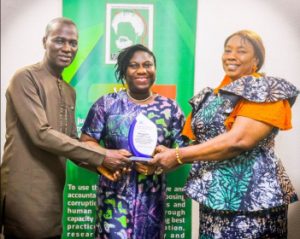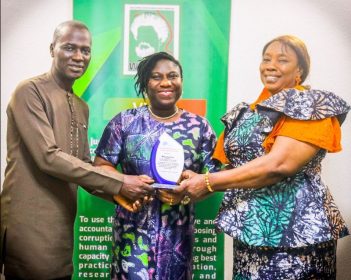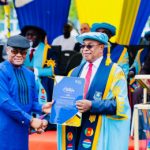Media-focused Non-Governmental Organisations (NGOs) have been asked to devote more resources to training news editors and mass communication lecturers in tertiary institutions to embrace professional trends.
Director of Media Career Development Network (MCDN), Lekan Otufodunrin, and Executive Director/CEO, Wole Soyinka Centre for Investigative Journalism (WSCIJ), Motunrayo Alaka, who made the call at a forum in Lagos, said this will help address media challenges towards achievement of better synergy and improved outputs for the sector.
Otufodunrin presented an award to Alaka in recognition of her outstanding contributions to capacity development for female journalists in Nigeria, globally and advocacy for gender equity in the news media.
In a brief remark before the award presentation which was first done virtually in 2022, the former Managing Editor, Online and Special Publications of The Nation Newspaper, Otufodunrin, who also presented ‘The media capacity development report’ by MCDN which was supported by the WSCIJ to Alaka said NGOs must create awareness and training opportunities for journalists and stakeholders within the media space.
He lauded the growing impact of ‘Report Women! Programme’ of the WSCIJ on the Nigerian media space and society saying the initiative was the rationale behind the award as part of MCDN’s activities to mark last year’s International Women’s Day.
Otufodunrin referred to the initiative that includes training, a fellowship programme, multi-level advocacy, and engagement with media management on the need to change the face of leadership in the newsroom to be as female as they are male, as a real game changer.
Another MCDN’s Board of Trustees member, Ugomma Cookey, thanked WSCIJ for its contributions to the media space, adding that the centre’s impact on the media and society through commissioned investigative stories, collaborations, media awards, and amplification of marginalised voices is commendable.
In the opinion of the Deputy Director of Training at the Voice of Nigeria (VON), more journalists are eager to take advantage of WSCIJ platforms.
While accepting the award, Alaka thanked MCDN for the recognition, noting.that the WSCIJ would look into more innovative ways to accommodate more journalists to benefit from the training on reporting issues concerning women and girls under the Report Women!.
She noted that media training is not the exclusive responsibility of media intervention organisations like the WSCIJ and enjoined seasoned journalists to bring their experience to bear through training and mentorship for upcoming professionals within their organisations.
As the call for the amplification and inclusion of voices of women continues, she cautioned that “The challenge with most inclusivity campaigns is that they easily become exclusive.”
Alaka therefore, advised that conversations about equity for women must include more men adding that constructive conversations are essential steps toward achieving equality in newsrooms and leadership positions.
During the brief event, higher institutions and media organisations were also encouraged to take advantage of available and experienced resources within their system to train the next generation of reporters.
So far, WSCIJ has trained 134 reporters in Nigeria and produced 74 FRLP Fellows. 12 female reporters are currently undergoing training under the 2023 FRLP cohort.

Many female journalists have already attained leadership positions in news media organisations courtesy of training and engagements with newsroom leadership.









Comment here